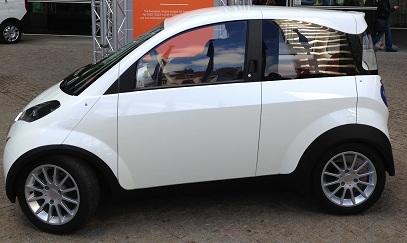Electric cars in the driving seat

Related topics
Innovation Transport Smart, green and integrated transport France Italy Poland United Kingdom Switzerlanddate: 29/08/2014
Project: Building blocks concepts for efficient a...
acronym: WIDE-MOB
See also: CORDIS
Contact: Contact
The environmental benefits of electric-powered cars are well known, but today’s models tend to be large, heavy and expensive compared to their conventional cousins.
EU-funded researchers working in the WIDE-MOB project have developed a small and highly efficient electric car for use in towns and cities. The work has swept aside many of the technical obstacles hindering full commercialisation and set the standard for a new class of safe, efficient and clean vehicles.
“It’s time to stop improving and start producing and selling,” says Pietro Perlo, of Interactive Fully Electrical Vehicles (I-FEVS), an Italian SME working with Polimodel, one of the project partners.
The car was developed in association with a sister project, P-MOB, which focused on electrical efficiency as part of the EU’s Green Car Initiative.
Less than 3 metres long by 1.5 metres wide, the stylish three-seat prototype weighs in at less than 600 kilograms without the batteries. Its four-wheel drive is uniquely powered by two electric motors, each with its own lithium-ion battery. Fully charged, the car has a range of up to 150 kilometres and a top speed of 120 km/h.
The batteries are topped up by solar panels which, in northern Italian meteorological conditions, supply enough energy to run the car for an average of 20 kilometres a day – adequate for many potential customers.
“iPhone of mobility”
WIDE-MOB has also reduced manufacturing costs by designing the car around a modular chassis. Known as a micro electric vehicle (micro EV), the design already meets all European safety requirements and is the first in its class to meet the new Euro NCAP crash safety standards introduced in June 2014. Quite simply, says Perlo, “we have the safest micro EV ever developed.”
He forecasts a huge market for these kinds of vehicles, reaching more than 1 million cars in Europe alone by 2020, simply because they will meet many people’s needs, at least in urban areas. Micro EVs could become the first and only car for many European families. “Through WIDE-MOB, we are convinced we have developed the equivalent of the iPhone of mobility.”
The priority now, he says, is to move into large-scale manufacturing. China is already mass producing micro EVs – 200 000 were turned out in 2013 – and Perlo says the project has been approached by numerous Chinese companies. “But our ambition is to produce in Europe because we think the most appealing opportunities are here on the old continent.”
WIDE-MOB completed its work in May 2014. Research and development is being taken forward by a consortium including such major players as Bitron, Magnetto Automotive, Oerlikon Graziano and the Bonetto Group – based in Torino and familiar with the technical demands of a highly competitive market.
“We are now targeting a pilot assembly line to produce micro EVs developed from the prototype,” says Perlo.
Dream team
The first delivery of the new vehicles, scheduled for July 2015, will be a small fleet for the Piemonte regional government. To produce 5 or 50 vehicles a day requires about the same investment, Perlo points out, and by the first quarter of 2016 he expects production to build towards 1000 units a month. So versatile is the design that production could switch from passenger cars to pick-up trucks to specialised vehicles from one day to the next at little extra cost.
Initial sales will be in Italy, with its fondness for small cars, then the rest of Europe and the wider world. By design, the prototype meets the specifications for the small and lightweight ‘kei’ class of vehicle which accounts for 40% of all car sales in Japan. Nissan and Mitsubishi are working to produce their own micro EV in 2016.
Perlo credits the WIDE-MOB project as being the catalyst that made all this possible. “The beauty of WIDE-MOB is that we could organise a dream team – we could organise collaboration among companies that otherwise would not work together, from a UK university supporting electric motor development to a French research institute helping with performance calculations. What makes me proud is that we have now convinced large and small companies in Torino to join the vision and participate not only as R&D partners but as co-designers, suppliers and investors.”
